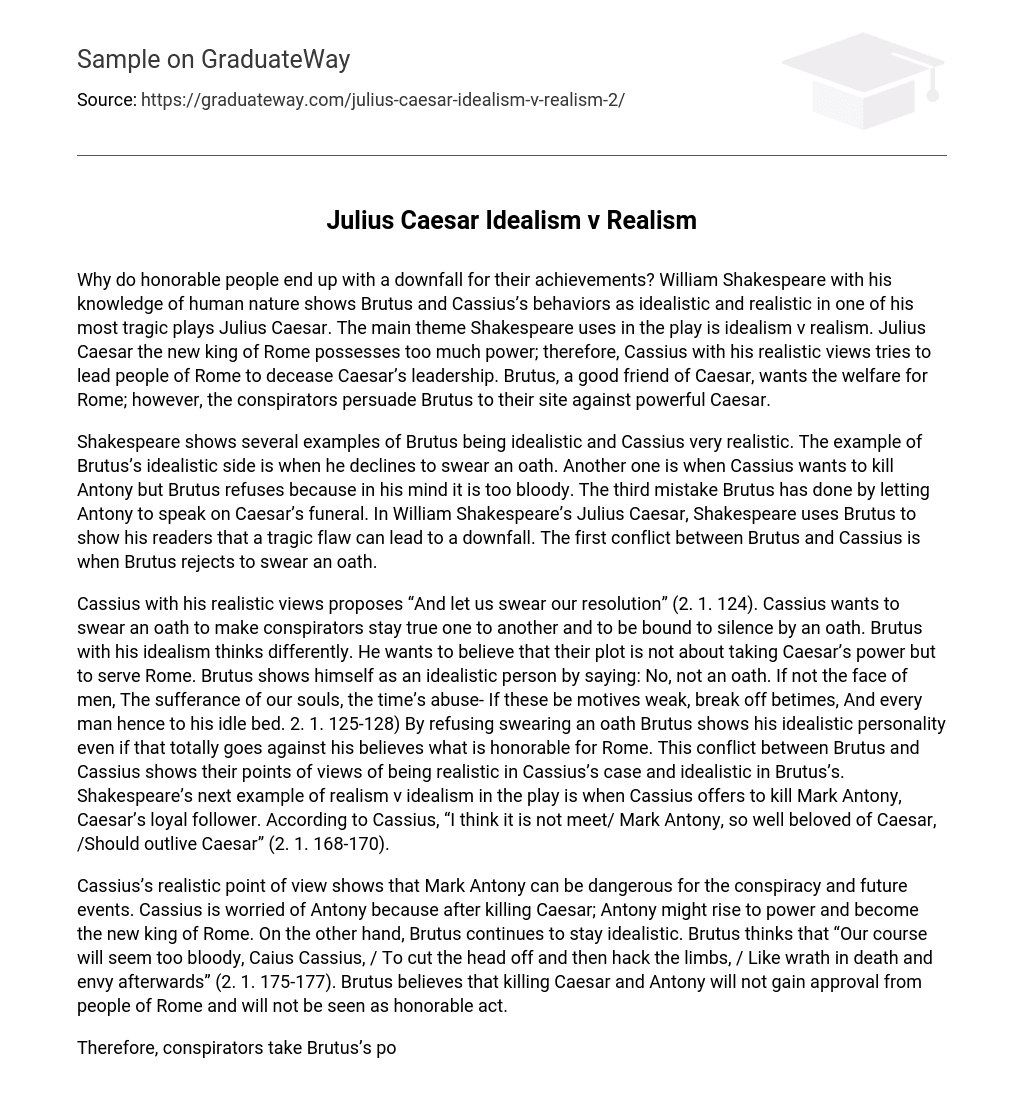Why do honorable people end up with a downfall for their achievements? William Shakespeare with his knowledge of human nature shows Brutus and Cassius’s behaviors as idealistic and realistic in one of his most tragic plays Julius Caesar. The main theme Shakespeare uses in the play is idealism v realism. Julius Caesar the new king of Rome possesses too much power; therefore, Cassius with his realistic views tries to lead people of Rome to decease Caesar’s leadership. Brutus, a good friend of Caesar, wants the welfare for Rome; however, the conspirators persuade Brutus to their site against powerful Caesar.
Shakespeare shows several examples of Brutus being idealistic and Cassius very realistic. The example of Brutus’s idealistic side is when he declines to swear an oath. Another one is when Cassius wants to kill Antony but Brutus refuses because in his mind it is too bloody. The third mistake Brutus has done by letting Antony to speak on Caesar’s funeral. In William Shakespeare’s Julius Caesar, Shakespeare uses Brutus to show his readers that a tragic flaw can lead to a downfall. The first conflict between Brutus and Cassius is when Brutus rejects to swear an oath.
Cassius with his realistic views proposes “And let us swear our resolution” (2. 1. 124). Cassius wants to swear an oath to make conspirators stay true one to another and to be bound to silence by an oath. Brutus with his idealism thinks differently. He wants to believe that their plot is not about taking Caesar’s power but to serve Rome. Brutus shows himself as an idealistic person by saying: No, not an oath. If not the face of men, The sufferance of our souls, the time’s abuse- If these be motives weak, break off betimes, And every man hence to his idle bed. 2. 1. 125-128) By refusing swearing an oath Brutus shows his idealistic personality even if that totally goes against his believes what is honorable for Rome. This conflict between Brutus and Cassius shows their points of views of being realistic in Cassius’s case and idealistic in Brutus’s. Shakespeare’s next example of realism v idealism in the play is when Cassius offers to kill Mark Antony, Caesar’s loyal follower. According to Cassius, “I think it is not meet/ Mark Antony, so well beloved of Caesar, /Should outlive Caesar” (2. 1. 168-170).
Cassius’s realistic point of view shows that Mark Antony can be dangerous for the conspiracy and future events. Cassius is worried of Antony because after killing Caesar; Antony might rise to power and become the new king of Rome. On the other hand, Brutus continues to stay idealistic. Brutus thinks that “Our course will seem too bloody, Caius Cassius, / To cut the head off and then hack the limbs, / Like wrath in death and envy afterwards” (2. 1. 175-177). Brutus believes that killing Caesar and Antony will not gain approval from people of Rome and will not be seen as honorable act.
Therefore, conspirators take Brutus’s point of view and he leads them to noble act to finish the king. After all conspirators have followed Brutus’s idealistic decision and have killed Caesar; Brutus makes another idealistic mistake by letting Mark Antony speak at Caesar’s funeral. After killing Caesar, Brutus talks to Antony about joining him. Antony agrees to be Brutus’s loyal follower as he used to be for Caesar, but he wants to give a funeral speech in honor of Caesar.
Cassius with his realistic point of view thinks that it is a bad idea to let Mark Antony give speech at Caesar’s funeral. Cassius tells Brutus, You know not what you do. Do not consent That Antony speak in his funeral. Know you how much the people may be moved By that which he will utter? (3. 1. 255-259) Cassius’s realism leads him to believe that Antony’s speech can be dangerous and people of Rome may reconsider to follow Brutus and other conspirators. Brutus idealism trusts Mark Antony’s choice and allows him to speak at Caesar’s funeral; however, with several agreements.
Brutus says: “You shall not in your funeral speech blame us/ But speak all good you can devise of Caesar/ And say you do ‘t by our permission” (3. 1. 270-272). Brutus wants Antony to speak only about Caesar but not about what the conspirators have done to him. Also, Brutus idealism blinds him to realize that the crowd may shift to favor Antony’s side. Mark Antony’s speech gets the people of Rome to choose his side and to turn they fury toward all conspirators, whom they kill. Brutus and Cassius, kept alive but forced to leave Rome.
William Shakespeare creates Brutus as an idealistic tragic hero in the play of Julius Caesar to show people that a tragic flaw can grow to a downfall. An honorable Roman man Brutus have done many idealistic mistakes throughout his life. He refused to swear an oath, was against killing Antony, and finally let Antony speak on Caesar’s funeral. Brutus’s idealistic thinking and these situations make his life a tragic flaw that led to a downfall. Hence, William Shakespeare’s message is being more realistic in life decisions, and he wants people to be honorable but not to be idealistic at the same time.





